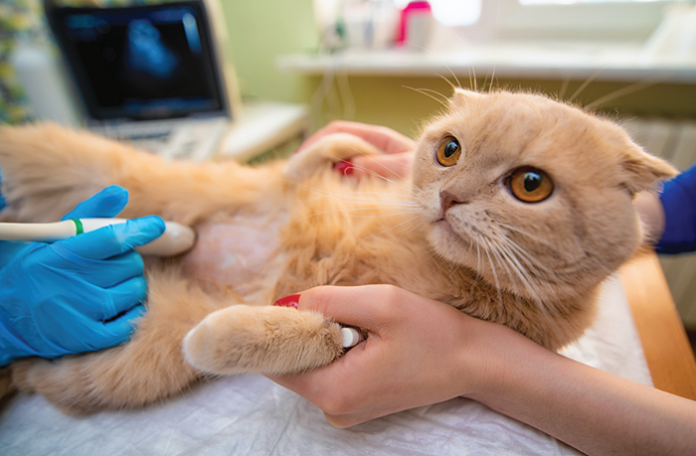At first glance, your cat may appear to be getting fat, but then you realize her belly looks bloated and feels squishy. She has not been eating normally, is lethargic, and may have been vomiting. Chances are, that big belly is fluid buildup.
“Ascites” is the technical term for fluid accumulation in the abdomen. The fluid may be due to an injury, organ malfunction, or a systemic disease. Usually, the onset of ascites is gradual, making it difficult for most cat owners to notice at first.
Diagnosis
Your veterinarian will do a thorough physical examination and may recommend an abdominal ultrasound to see the extent of the fluid buildup. Radiographs can identify ascites, but they are a much less sensitive test for this condition. In addition, a complete blood count, chemistry panel, and urinalysis may be recommended to try to determine the cause of the fluid buildup.
Fluid samples will be sent to a pathology laboratory for microscopic evaluation, which will give your veterinarian information about the cellular components of the fluid.
A classification of “transudate” indicates a low-protein fluid and suggests liver, kidney, vascular problems, or possibly an intestinal disease. A “modified transudate” generally means the fluid has evidence of inflammation. Modified transudates have increased protein and cells, including, in some instances, hepatic lymph cells or cancer cells. FIP and lymphocytic plasmacytic cholangiohepatitis (inflammatory liver disease) tend to cause modified transudate fluid.
However, notes Sharon A. Center, BS, DVM, DACVIM, Professor of Medicine in the Department of Clinical Sciences, College of Veterinary Medicine at Cornell University, right-sided heart failure, chronic hepatitis, and various cancers can all lead to ascitic fluid that is usually a pure transudate or modified transudate with low albumin concentration.
Treatment
The main causes of fluid buildup in the abdomen include:
- Cancer
- Feline infectious peritonitis (FIP)
- Kidney disease
- Liver disease
- Pancreatitis
- Physical trauma
- Right-sided heart failure
- Ruptured blood vessel
- Ruptured urinary bladder
- Splenic trauma
Any cause of right-sided heart failure, such as some congenital malformations in kittens, may cause ascites. Heart problems are often picked up by veterinarians during routine physical examinations. Further testing may include an electrocardiogram (EKG) and an echocardiogram.
Many cancers will shed cells into the ascitic fluid, leading to a conclusive diagnosis if neoplastic cells are found and identified by a veterinary clinical pathologist. Abdominal cancers in cats include lymphomas, hemangiosarcomas, and a range of sarcomas and carcinomas.
While the fluid can be removed using a fine needle that is passed through the abdominal wall (abdominocentesis), this is usually not a cure and care must be exercised to maintain fluid balance and protein levels in circulation. Medications such as diuretics may be used to induce urination to decrease the degree of ascites in some patients.
The cause of the fluid buildup must be addressed to prevent it from recurring. For ascites secondary to trauma, surgery may be necessary.
Unfortunately, ascites is often not a good prognostic sign for your cat, but your best bet is to get your cat to your veterinarian immediately if you notice what appears to be fluid buildup in the abdomen of your cat.




